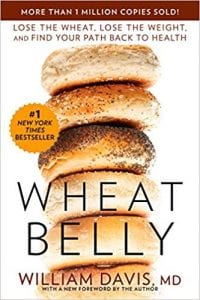 With a number of high-profile celebrities crediting gluten-free weight loss plans as the reason for their sleeker figures, it’s not difficult to see why more and more people are jumping on the gluten-free weight loss bandwagon.
With a number of high-profile celebrities crediting gluten-free weight loss plans as the reason for their sleeker figures, it’s not difficult to see why more and more people are jumping on the gluten-free weight loss bandwagon.
In fact, Americans spent over 7 billion dollars on gluten-free diet foods in the past twelve months alone. But can you lose weight on this type of regimen? And, it so, just how quickly, and is it safe?
We will answer those questions in this article on gluten-free weight loss plans. We will also look at what nutritionists and dieticians have to say about the diet.
Table of Contents
What is Gluten?
Much of the confusion surrounding gluten-free weight loss stems from people thinking gluten and carbohydrates are the same. This is not the case.
Gluten is a protein found in many whole-grain foods that contain carbohydrates. A carbohydrate is a food nutrient – starch or sugar.
The primary source of gluten in our diet comes from wheat, barley, and rye, and products containing these, including bread, pasta, cereals, muffins, cakes, cookies, crackers, pretzels, pie crusts, and the like.
Along with wheat, many of these foods contain sugar and sometimes fat. Most are high in calories.
Anyone who eliminates the above foods from their diet, replaces them with unrefined carbs (such as those found in fruit and vegetables), and follows a low-calorie diet, should lose weight.
However, the vast majority of people who go gluten-free do not adopt this approach.
Are Gluten-Free Weight Loss Plans Worth Trying?
After consuming foods containing gluten, people with celiac disease experience symptoms that may include headaches, bloating, diarrhea, and fatigue.
Individuals with gluten sensitivity or intolerance suffer similarly.
By eliminating these foods from their diet, there’s no question that those affected can significantly improve their quality of life.
However, research has shown that around 9 out of 10 people who purchase gluten-free foods are not gluten intolerant.
These people think gluten-free equates to health and that by eliminating gluten from their diet, they will lose weight.
But does following a gluten-free diet to lose weight really work?
According to many dieticians and health professionals who claim to have studied the effect of this type of diet, people who are not gluten intolerant will not lose weight eating gluten-free diet foods.
They reached this conclusion without any major studies having been carried out to back their claims.
This has left others in the weight loss field speculating that weight loss could result from following a gluten-free diet. That’s certainly possible, as a wide range of foods will be eliminated from the diets of those who cut gluten.
Does Wheat Belly Prove the Gluten-Free Weight Loss Plan Works?
Dr. William Davis, a leading cardiologist and author of the #1 New York Times Best Seller, Wheat Belly, recommends the gluten-free diet to lose weight. 
Dr. Davis reports that his patients who follow the diet commonly drop between 15 and 20 pounds during the first month. He claims to have documented this in several thousand patients, regardless of whether or not they have celiac disease.
With any diet, some of the initial weight lost will be water. But with this diet, Davis says that his patients quickly notice a much smaller waistline and a flatter tummy.
This sparks the question, is there something in wheat and gluten-based foods that cause people to gain weight or eat more?
While medical studies to date have not uncovered a definitive answer, Dr. Davis’ research and the results in his medical practice are undeniable. This being the case, it is safe to assume that following a gluten-free diet to lose weight can work well for overweight people.
According to Dr. Davis’ theory, though gluten is the main culprit, other proteins and starches in wheat also play a part in weight gain. Dr. Davis says that wheat consumption greatly increases insulin levels.
Insulin is a hormone that transports sugar from the bloodstream to the body’s cells. An overly high level often leads to a low blood sugar level, which in turn makes us feel hungry. For many of us, this inevitably leads to snacking.
Over time, as the cycle continues, weight gain tends to accumulate around the abdominal area. Barley and rye affect insulin levels in the same manner, so these, too, should be eliminated.
Gluten-Free Cooking
Cooking gluten-free can be a challenge for those who are new to it. With this in mind, Dr. Davis penned another best seller in the Wheat Belly cookbook. A compilation of 150 easy and delicious recipes suitable for every occasion, they should appeal to even the fussiest of eaters.
Another very popular cookbook in the range is the Wheat Belly 30-Minute (Or Less!) Cookbook. Containing 200 quick and easy recipes, these are perfect for busy people who want food that tastes great and can be on the table in a flash.
Click here to read reviews of other popular diet books.
Getting the Best Results From Gluten-Free Weight Loss Plans
Something to be aware of is that food that is labeled gluten-free isn’t necessarily low in calories. To lose weight on this type of diet, you will need to control your portion size.
With many of us leading busy lives, we like the convenience of packaged food. This means that when we see gluten-free cereal, brownies, cakes, and cookies, we may buy them thinking we’re doing the healthy thing and that they will help us lose weight.
In reality, we are usually just swapping an ingredient such as wheat flour for the rice flour, corn starch, or potato starch used in most packaged gluten-free foods.
Pre-packaged gluten-free products are expensive. More often than not, they are higher in sugar, carbohydrates, and calories than comparable products that contain gluten. This makes them useless as a weight loss aid. It also makes them a complete waste of money for anyone who is not gluten intolerant.
Gluten-Free Weight Loss Plans Conclusion
So can you lose weight on a gluten-free diet? Here’s what we know:
• Overweight or obese people with celiac disease are likely to lose weight by going gluten-free.
• No studies have been published to date, but according to Dr. Davis, even those who don’t have celiac disease can lose a significant amount of weight on a gluten-free diet.
• People who cut gluten from their diet but increase their consumption of other foods, including high-calorie packaged gluten-free replacement foods, will not stand to lose much weight, if any, by following this type of diet.
• Those who steer clear of packaged gluten-free foods high in calories, carbs, and sugars will get the best result from this diet.
Avoiding these and centering your diet around fresh vegetables, lean meats, nuts, Greek yogurt, and eggs, along with small amounts of fresh fruit and gluten-free grains, is the way to go.
So by all means, give gluten-free diet foods a go. Just keep in mind that eliminating gluten from your diet may not have a more significant effect on your weight than any other good weight loss plan will.

